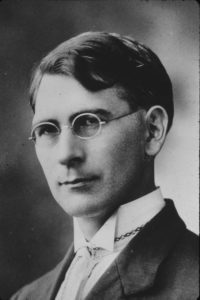Before his death in 1923, one of his most notable accomplishments was the start of a ministry in Oubangui-Chari (French Equatorial Africa) in what is now the present-day Central African Republic. The fruit of this ministry was founded on his pleas, intercession, and conversations with the God he loved.
James Gribble’s mother had once said of him, “My son was known to rise every morning at two o’clock to pray for members of his own family, many of whom were as yet unconverted. He was up again at 4:30 a.m. for his regular devotions, which included all parts of the world.” (1)
James would literally spend at least an hour every morning praying.
And, if he was sick or was prevented from doing his other work, “he simply added to his hours of daily intercession.” (2)
Dr. Florence Newberry Gribble, his wife, records, “James was traveling, preaching, giving illustrated lectures, or writing letters and articles for publication, but never was he too busy to pray. ‘Prayer is the greatest thing I have done today,’ he would often say.” (3)
It is said of him that out of desperation for the spread of the gospel “he had prayed literally every night and day for the opening up of this particular portion of Central Africa to the gospel!” (4)
When they set sail in 1918 to do ministry in Central Africa, they arrived several months later at the entrance but were denied immediate entry. Their little missionary team consisting of James and Florence Gribble, their daughter Marguerite, and two single missionaries waited for permission to enter the Oubangui-Chari for two full years!
The camp where they stayed for those years was aptly called by the team “Camp Wait-Some-More”. Though it was a long stay, their waiting was not spent in vain. James Gribble and the team waited on bent knees.
There is no doubt that those two years of prayer at Camp Wait-Some-More set the foundation for the miraculous work that would follow.
After being allowed to enter the Oubangui-Chari, James wrote, “These are busy days here, but we do not allow ourselves to be too busy to pray. Intercession, in spite of the pressure of other duties, is the greatest work that any missionary can do.” (5)
He also wrote in one of his letters, “Yesterday, I did nothing but pray. I literally spent the day in prayer, as I felt that we faced crisis in our work.” (6)
After serving a year in Africa, he decided to celebrate this anniversary with a night of prayer. His wife wrote that this very night should be considered by all as the birth-night of the mission in the Oubangui-Chari.
Though he was uncertain if he would see it for himself, God reassured James on that night (November 29, 1919) that there would be an evangelistic ministry in the area of Oubangi-Chari.
In 1921, there was absolutely zero African believers in the Oubangui-Chari.
Today there are over 3 million believers living in the Central African Republic. In fact, according to the Joshua Project, 70 percent of the population in the C.A.R. are Christian and 32 percent are considered evangelical. Not only was James Gribble’s prayer concerning his ministry in Oubangui-Chari answered, but his prayer for the gospel to penetrate the whole Central Africa region was too.
The man who said, “There is no place in all the world needier, no place more dark, than Central Africa. It is as if all Earth and Hell have united in saying ‘NO’ to the carrying of the gospel there”, overcame that reality with a life of faithful prayers.
What can we learn about prayer from James Gribble? The answer is simple. A life of consistent prayer to the God of the universe through Jesus by the power of the Holy Spirit will accomplish the Great Commission of the Church to see every tribe, tongue, and nation savor the supremacy of Christ in all things.
1. Stranger than Fiction, p. 85–86
2. Undaunted Hope: Life of James Gribble p. 42
3. Undaunted p. 171
4. Undaunted p. 47
5. Undaunted, p. 318
6. Undaunted, p. 300

 In 1883, James Gribble was born in Mechanicsburg, PA. Over half of his life was spent serving in the mission of God to reach the world for Christ. By all accounts, James Gribble was a man of prayer.
In 1883, James Gribble was born in Mechanicsburg, PA. Over half of his life was spent serving in the mission of God to reach the world for Christ. By all accounts, James Gribble was a man of prayer.

